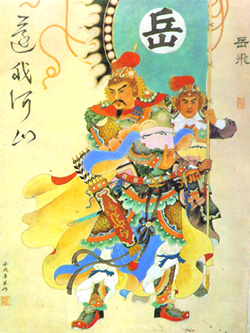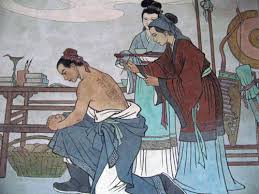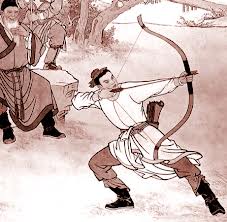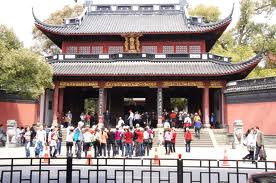MARSHAL YUE FEI AND THE QUALITIES OF XINGYIQUAN FOR LEADERS

Marshal Yue Fei
Question
Can you please elaborate a little about the background and character of General Yue Fei, who is regarded as the God of Martial Art in China?
For people in leadership positions, what are the qualities that Xingyiquan will promote, enhance and strengthen?
Sifu Lee Wei Joo
Answer
In the English language, Yue Fei is often referred to as a great general, but in the Chinese language he is often referred to as a great marshal, which he was, with many generals under him. Hence, in Chinese we read and hear of Yue Yuan Shuai instead of Yue Jiang Jun, i.e. Marshal Yue instead of General Yue.
Yue Fei is deified as "wu sheng". The other great warrior who is also deified as "wu sheng" is General Guan Yu of the Three-Kingdom Period, about 10 centuries before Yue Fei.
Guan Yu was also known as Guan Yun Chang. He is often referred to as Guan Gong, which means Lord Guan. He was famous for the use of Guan Dao, which is named after him and it means Guan's Big Knife. Yue Fei, on the other hand, was famous for his metal spear as well as bow and arrows.
"Wu sheng" can be variously translated into English. "Wu" means "martial", and may sometimes mean "war". "Sheng" means "sage" and may also be translated as "god".
The term "Da Sheng", meaning "Great Sage", is usually used to refer to the Monkey God, who was honoured by the Jade Emperor of Heaven as the "Great Sage Equal to Heaven". Interestingly, the term "god" or "shen" (note: not "sheng") has never been used in Chinese to refer to the Monkey God, who is many levels higher in spiritual development than gods in Chinese culture.
Hence, "wu shen" may be translated as the "God of War". That, in fact, is what Guan Yu is usually referred to, though I prefer to refer to him as the "God of Righteousness" because he is best known for righteousness and not for warfare though he was a great warrior. As this term was coined by me, not many people, at least not now, may have heard of the God of Righteousness.
Hence, Yue Fei, being wu sheng, may be referred to as the God of War too by English speaking people, though most of them when they hear of the term "God of War" would probably think of Guan Yu. But, in a moment of inspiration, I prefer to translate "wu sheng" in the case of Yue Fe as the God of Martial Art, as he was the first patriarch of three styles of Chinese martial arts, namely Xingyiquan, Eagle Claw Kungfu and Yue Family Kungfu. As in the case of the God of Righteousness, not many people, at least not at present, would have heard of the God of Martial Art.
It is also worthy of note that the concept of "god of war" is normally not in the mind of Chinese speaking people when they come across the term "wu sheng". In other words, Chinese speaking people would not think of Yue Fei and Guan Yu as Gods of War. If Chinese speaking people wish to refer to a god of war in the Chinese language, they would probably use the term "zhan shen".
The term "wu sheng" carries more respect and reverence than the term "zhan shen". "Zhan shen" would give connotations of a fighter who brings destruction, often with disregard to those involved. "Wu sheng" gives connotations of a great warrior who fights for a noble cause, and would avoid destruction if possible.
This linguistic and cultural background is not only interesting but also beneficial. As I have mentioned in an answer elsewhere, a great language like English and Chinese is not merely a vehicle for communicating ideas and emotions, but also greatly influences the way we think and develop. This background knowledge not only reflects that Marshal Yue Fei was not a fighter who brought random destruction but a great warrior with principles, but also reminds us that our martial art training is not just to exchange blows but leads to our development of courage and righteousness. These qualities are very important for people in leadership positions.
Yue Fei (1102-1143) was born to a poor family during the Song Dynasty. According to a legend, Yue Fei was the reincarnation of the garuda, da pang in Chinese, a legendary gigantic bird that provided shade for and protected the Buddha. Seeing that the Song government was corrupt and was invaded by the Jurchens, the Buddha sent the garuda to protect the people.
Yue Fei's father saw a big bird fly into the house just before Yue Fei was born. That was how Yue Fei got his name. "Fei" means "fly", and referred to the flying big bird.
Unlike other babies, Yue Fei never cried. An immortal, disguised as a wandering priest, told Yue Fei's father that when Yue Fei cried, the father should put the baby and the mother in a big earthen jar. A few days later the baby cried. This triggered off a huge flood that destroyed the village. But the floating earthen jar saved Yue Fei and his mother.
His mother tattooed the words "jin zhong bau guo", which mean "extreme loyalty to repay the nation" on the back of Yue Fei. Yue Fei learned martial art and strategies from a great Shaolin master, Zhou Tong. His classmates were Lin Chong and Lu Jun Yi, two great kungfu masters who later joined the outlaws on Liang Mountain in the legends of the Water Margins.
Yue Fei joined the army, and due to his abilities and successful military campaigns rose from being a private to a marshal within a short time. The Jurchens from the north had sacked the northern Song Dynasty, established the Jin Dynasty and took the Song emperor and some loyal families as captives. One of the princes escaped and set up the Southern Song Dynasty. Yue Fei was determined to drive out the Jurchens and restore the Song.
Besides being highly skilled in martial art, Yue Fei was also a scholar. Despite being very busy with military planning, training and campaigns, he still found time for his scholarly pursues. His favorite readings were Sun Tzu's Art of War and Spring and Autumn Annals, especially Confucius' commentaries. His calligraphy had special flowing characteristics of its own. He produced some poetic works.
Lines from his famous "Man Jiang Hong", or "The River is Fully Red", are frequently quoted still today, like the following.
- Thirty years of work and fame are like dust and dirt
- Eight thousand miles of travel one can only see clouds and the moon
- But I won't wait in idleness
- When the hair of a young man has turn white
- For empty sorrow
Yue Fei's campaigns against the Jurchens were very successful. In between campaigns, Yue Fei taught Xingyiquan to his generals, and Eangle Claw Kungfu to his soldiers. His army was well disciplined and highly efficient in combat.
Once he had only 800 men, but defeated the enemy of 50,000. This led the Jurchen commander to commend that they could move Mount Thai, the highest mountain in China, but not Yue Fei's armies.

Yue Fei's mother tattooed the words "Extreme Loyalty to Repay Nation" behind his back
Yue Fei and his generals were at the battlefront for years, dutifully fighting for the Song government despite knowing that many high ranking ministers were corrupted. Once a general asked Yue Fei when he thought there would be peace.
"When civilian officials do not love money and military officials are not afraid to die, peace will come naturally," Yue Fei answered with much wisdom.
Yue Fei was about not only to drive the Jurchens completely out of Song territories but also to capture the Jurchen capital. But he waited for permission from the emperor before taking action. He sent a detailed report to the emperor.
But imperial officials were corrupted. Both the emperor, Gaozong, and his prime minister, Qin Gui, were not keen to defeat the Jurchens, because the Jurchens would then have to release the captured former but rightful emperor, Gaozong's father, who would then restore his reign. Gaozong and Qin Gui secretly made peace with the Jurchens, and ordered Yue Fei to stop his campaigns. Receiving the emperor's order one morning prompted Yue Fei to write
- Thirty years of work and fame are like dust and dirt.
The Jurchens renegaded on the peace treaty and attacked the Song. Again Yue Fei pushed them back decisively. The emperor and the prime minister became anxious. They plotted to call back Yue Fei and kill him!
The emperor sent out an imperial degree in the form of a gold plate to call Yue Fei from the battle frontline back to the palace. Kungfu masters in the public knew about it and they intercepted the imperial degree.
The emperor continuously sent out the degree each time the earlier one was intercepted. Eleven imperial degrees on gold plates were intercepted at various times and places, but the twelfth got through to Yue Fei. This constitutes the story of "The Twelve Gold Plates".
Yue Fei himself and his generals knew about the plot to kill him. The generals begged Yue Fei not to return to the palace. Indeed, there was a tradition honoured by emperors of all dynasties that a marshal or a general at a battlefront had the right to reject an imperial degree.
Yue Fei took off his attire and showed his tattooed words to the generals, "extreme loyalty to repay the nation". Yue Fei said he would rather he killed than disobeyed his mother's words.
Sure enough, when Yue Fei, his eldest son, Yue Yun, and a general, Zhang Xian, walked into the palace over a trap, hidden palace guards pulled up trap ropes and tied them together. The three were brought before the prime minister, Qin Gui, who accused them of treason and rebellion.
Indeed, Yue Fei's army had become so huge that he could easily overthrew the Song government had he wanted to. But, of course, he was loyal to the emperor despite knowing that the emperor plotted to kill him.
A famous general, Han Shi Zhong, asked Qin Gui what evidence he had for his serious accusations. Qin Gui replied that if the accusations were true, they would be in trouble. This expression, "if the accusations were true", but without producing any evidence, or "mo xu you" in Chinese, has entered the Chinese language to mean a trumped-up charge.
No one could produce any evidence against Yue Fei. Qin Gui and his wife were sitting by their eastern window when his wife came up with a plot to poison Yue Fei, Yue Yun and Zhang Xian while they were in prison. Later this came to be called the Eastern Window Plot.
Yue Fei was only 39 when he was murdered.
The succeeding emperor, Xiaozhong, cleared all charges against Yue Fei and bestowed many honours posthumously on the famous marshal. A temple for Yue Fei was built at the beautiful West Lake in Hangzhou. Two iron statues of Qin Gui and his wife were made to kneel before the temple for the wrong they did to Yue Fei. For centuries they were spat on and cursed by visitors.
Later Chinese pastry makers made from flour two figures to resemble Qin Gui and his wife, fried them in oil, and ate them. This has become a popular Chinese pastry called "youzhagui" or oil-fried Gui.
Yue Fei fought a total of 126 battles, but did not lose a single one! How did he achieve this incredible feat?
Yue Fei's grandson, Yue Ke, provided a description of Yue Fei's military methods;
-
Careful Selection
Yue Fei selected his soldiers carefully. He believed that one good soldier was better than a hundred mediocre ones. When a new army of soldiers joined his, he filtered out the weak and old and retained only the strong and fit.
-
Good Training
He provided good training to his soldiers. He taught his soldiers Eagle Claw Kungfu, and his generals Xingyiquan. These kungfu styles proved to be very effective in battle fields.
-
Rewards and Punishments
His rewards were handsome and punishments severe but both were clear and fair. Once he ordered his own son to be beheaded for falling from horseback. His son’s life was spared only when many generals knelt to beg for his mercy.
-
Clear Orders
His orders were always clear and easy for his generals and soldiers to carry out. Whoever failed to carry out the orders were severely punished.
-
Strict Discipline
Whenever the army crossed a countryside or passed a town or village, fields and properties were left intact. Everyone had to pay for goods they bought.
-
Close Fellowship
Yue Fei maintained close fellowship with his generals and soldiers. He ate the same food as they, and often shared the same tent with his generals.
Yue Fei taught Xingyiquan to his generals. People in leadership positions today are also generals. Xingyiquan is effective in promoting, enhancing and strengthening qualities that generals of both classical times and modern times need.

The famous Shaolin master, Zhou Tong, taught Yue Fei how to use the bow
A very important quality is decision making. Many top business executives have told me that making a wrong decision is better than not making any decision. Nothing, not even making a loss, is worse than dilly dallying in business.
Xingyiquan forces us not just to make a decision, but to make a good decision fast. Other kungfu styles also enable us to make good and fast decision, but Xingyiquan is especially suited for this purpose. Why is it so?
It is so because of the nature of Xingyiquan combat. In combat, Xingyiquan is simple, direct and powerful, and is almost always pressing forward.
When an opponent throws a Xingyiquan exponent a punch, because there are not many techniques to choose from, the Xingyiquan exponent's decision in what counter to respond is likely to be faster than another exponent practicing a kungfu style with many choices, like Baguazhang for example.
The fact that in Xingyiquan, the exponent has to move forward will force him to make a fast decision in his response. If he practice an art that allows him to bounce back, like in Boxing, or to sink back, as in Taijiquan, he may delay his decision in making a response. He will not be hit even when his decision is slower because he has moved back from the attack.
But this is not the case with a Xingyiquan exponent. He is moving into the attack! If his decision is not fast, he will be hit.
The interesting fact is that as long as he has learnt Xingyiquan from a competent teacher, as long as he responds with a Xingyiquan technique, it will be a right response! Those who have not learnt Xingyiquan, or have not learnt it from a competent teacher, may not understand what is said here.
So the nature of Xingyiquan combat is such that a practitioner has to make a decision fast. And as long as he makes a fast decision, it will be a right decision!
For people in leadership positions, it is important to make decisions. Making a wrong decision is often better than not making any decision. In Xingyiquan, practitioners are trained to make good and fast decisions. Isn't Xingyiquan good training for those who aspire to leadership positions?
This interesting quality applies to Xingyiquan but may not apply to other martial arts. In other martial arts, practitioners may make fast or slow decisions. Regardless of whether their decisions are fast or slow, they may not be right decisions, though it is better than not making any decisions. But in Xingyiquan, practitioners cannot chose to make slow decisions, they have to make fast decisions. When they make a decision, even when it is done very fast, it will be a right decision.
Hence, for people aspiring to leadership positions, if they do not have this quality of making fast and right decisions, practicing Xingyiquan will promote it. If they already have this quality, practicing Xingyiquan will enhance it. In Xingyiuan, as they move forward into combat, their decision making has to be faster and faster.
If it is enhanced, practicing Xingyiquen will strengthen it. In other martial arts, other practitioners may not employ this quality every time, like when they retreat or when they wait for their opponents to attack. In Xingyiquan, practitioners press in to attack relentlessly, thus strengthening their ability to make fast and right decisions.
Another very important quality for people in leadership positions is courage. Having made a decision, you must have the courage to carry it out.
Xingyiquan is excellent in providing this courage. It is more effective in this respect than many other martial arts. In some arts like Judo and Taijiquan, the lack of courage can be compensated by patience. If you are not courageous enough to go in to attack your opponent, you can patiently wait for opportunities. In Xingyiquan you are trained to courageously go in to strike down your opponent.
But courage must not be confused with bravodo. In some martial arts like Karate and Taekwondo, exponents charge in to exchange blows. This is bravado. Courage should be tempered with wisdom. You move in courageously but with the wisdom to ensure you are safe. As a person in leadership position, you move into the market courageously to gain profits, but you ensure your company will not lose due to carelessness.
If you lack courage but aspire to leadership positions, Xingyiquan will promote this quality in you. If you already have courage, Xingyiquan will enhance it. Then Xingyiquan will strengthen your quality of courage.
Besides courage, to move in effectively to gain victory in martial art as well as in leadership positions, you also require mental clarity and internal force. Xingyiquan is excellent in promoting, enhancing and strengthening these two qualities.
Two other qualities that people in leadership positions need are loyalty and responsibility. Loyalty is not directly learnt by practicing Xingyiquan, but its first patriarch, Yue Fei, certainly inspires us with loyalty. Responsibility can be learnt from practicing Xingyiquan, but the story of Yue Fei enhances and strengthens our sense of responsibility.
Loyalty is not just upward, but downward as well. Yue Fei was extremely loyal not just to the emperor above him, but also loyal to his generals and soldiers below him as well as the Song people in general. His loyalty was firmly established in the words, "Extreme Royalty to Repay the Nation", permanently tattooed on his back.
It is often debated whether Yue Fei was loyal to the emperor to a fault, whether it would be better and righteous if he placed priority of his loyalty to the people below instead of to the emperor above in the demonstration of his extreme loyalty to the nation.
In debating this question, one should also consider the perspective of time. In Yue Fei's time, nation was symbolized by the emperor. To people in the modern age nation is generally symbolized by the people
Practicing Xingyiquan will promote a sense of responsibility if a practitioner does not have it initially, and will enhance and strengthen it if it is already present. Unlike some kungfu styles where many techniques are compassionate, every Xingyiquan technique is combat-ending. Xingyiquan practitioners have to use their Xingyiquan with much responsibility.
Some external martial arts are brutal, but being brutal is not the same as being combat-ending. Indeed, Xingyiquan is elegant though combat-ending if the practitioner executing the technique wishes to, otherwise he may hold the technique just before hitting, which manifests his sense of responsibility.
On the other hand, these external martial artists do not hold their strikes. In fact they often increase their brutality by working themselves into a frenzy, as if to lose whatever sense of responsibility they may have so as to punish their opponents brutally. But their brutal strikes, while being destructive physically and spiritually to their opponents as well as to themselves, are not combat-ending, or else they would not continue to exchange blows. This type of training is not suitable for those who aspire to leadership positions.
Xingyiquan is combat-ending because of its tremendous internal force, for which Xingyiquan is famous. What would be the case if a Xingyiquan practitioner does not have internal force? Then he is not practicing Xingyiquan correctly. It is like a manager without authority. Both the bogus Xingyiquan practitioner and the bogus manager are making a mockery of themselves. What they do is counter-productive to leadership positions.
A sense of responsibility, or the lack of it, is famously manifested in the story of Yue Fei. Qin Gui, the prime minister, accused Marshal Yue Fei for rebellion and treason, but Qin Gui had no evidence to substantiate his accusations. His justification was if the accusations were true, it would be big trouble. This concept of "if the accusations were true" is now established in Chinese idiom as "mo xu you" and reminds us of our responsibility.
If you merely hear about accusations and join in to contempt the accused without sufficient evidence, you show a lack of responsibility. If you strongly accuse someone without sufficient evidence, it is worse. It does not mean that the accusations cannot be true, but it is being responsible to make accusations only when you have sufficient evidence and are ready to show it. This is a mark of people in leadership positions.
The historical background and the character of Marshal Yue Fei are inspiring. He was deified as "Wu Sheng", which is often translated as "God of War" but I translate it as "God of Martial Art".
Xingyiquan was developed by Yue Fei and taught to generals at the battlefront. Practicing genuine Xingyiquan promotes, enhances and strengthens quailities of decision-making, courage, loyalty and responsibility which are very important for people in leadership positions.

Yue Fei Temple in beautiful Hangzhou
Xingyiquan Questions and Answers
The questions and answers are reproduced from the thread 10 Questions to Sifu about Xingyiquan in the Shaolin Wahnam Discussion Forum.
LINKS
